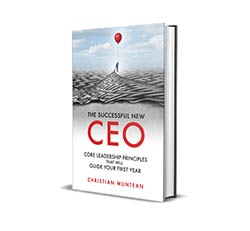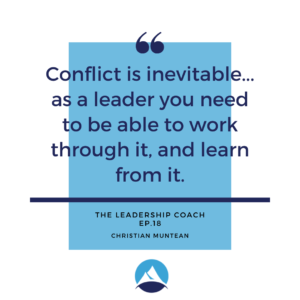Escape the “Busy-ness” Trap: How to Find Freedom from Never Getting Caught Up

 I recently had a conversation with a colleague, Steven Rice, who made an interesting observation about leaders. In his words, “Most leaders think they are too busy but really they are feeling ineffective.”
I recently had a conversation with a colleague, Steven Rice, who made an interesting observation about leaders. In his words, “Most leaders think they are too busy but really they are feeling ineffective.”
This rings very true. I spend a lot of time talking to leaders who feel too busy. Overwhelmed. Inundated with demands on their time and attention.
They are falling behind on the decisions they need to make, the problems that must be addressed, the vision that has to be formed, staff problems that demand attention, proposals that must be written, clients issues to be resolved… It’s too much. It’s overwhelming.
When I find organizations that are stuck, they nearly always are led by someone who feels overwhelmed, largely because they aren’t being as effective as they know they should be. This state of overwhelm is the key issue that holds leaders back. It’s the thing.
Solving it is not about being smarter or working harder. That just digs a deeper hole. Because the problem isn’t all the problems. Those will never go away.
The problem is the way a leader works.
It Doesn’t Have to Be This Way
Most leaders, when they feel overwhelmed or ineffective, try to do one of two things:
- They try to work harder and faster. Or –
- They stop trying – and accept a smaller level of success.
Now, I don’t think there is a moral need to lead ever larger and more complex organizations – or that you shouldn’t find contentment leading something simple and small. But I do know that many leaders have a much larger vision. They know there is greater potential.
And they want to pursue it.
But…they are overwhelmed.
What Can Be Done? The Three Practices that Make the Difference
There are three basic practices that any leader can adopt which will change the “overwhelm” dynamic to one of meaningful, consistent successes. I can’t overstate this, if you feel overwhelmed and ineffective, these practices will transform your life.
These three practices are:
- Rigorous focus
- Intentional action
- Build trust – in yourself and others
In all of the leaders I’ve coached – if they are struggling, or feeling overwhelmed, or not making progress – the issue is in one or more of these three areas.
Practice One: Rigorous Focus
Leaders tend to fall into one of two different categories – having too many targets or no clear target.
Too many targets: To rephrase a quote from the movie The Incredibles, “If everything is a priority – nothing is a priority.” When leaders allow their attention to fall victim to too many demands, they lose focus. Without focus, there is often a lot of effort and work. But little progress.
No clear target: Some leaders just never develop a target or even a list of priorities. They don’t know what they are working towards, they haven’t defined a direction. As you’ve probably heard – if you don’t know where you are going, any path will take you there. But even worse – no focus means you never have a sense of progress. You will always feel ineffective.
The three-ingredient solution?
- Choose one thing to focus on. This doesn’t mean you will only do one thing. But it means you will only focus on one thing at a time. Ironically, pursuing one thing will lead to many things being accomplished. When you accomplish one thing – move to the next one thing.
- Say “No” to other things. We want to please. We want to stay on top of things. We want to feel valuable or relevant. Whatever it is – not saying “No” is preventing your success.
You’ve probably heard this before – and it’s true: Whenever you say “Yes” to something, you automatically say “No” to something else. The problem is, we allow our lives to be controlled by these unintended “No’s.” And we aren’t intentional about what we say “Yes” to.
- Start with small steps. Leaders often want to run before they can crawl. Start with small steps. Get small wins. Make your forward progress manageable and measurable. If you don’t quit – these small steps add up faster than you may think.
Summary: I don’t meet highly focused leaders who aren’t making progress on their goals.
It might feel counterintuitive – to accomplish more with less effort – focus on doing less. It’s what works.
Practice Two: Intentional Activity
Leaders who feel overwhelmed and ineffective nearly always let their schedules and plans be determined by external events. Effectively, they are not leading. They are letting circumstances and the demands of others lead them. Being busy and handling all of the never-ending crisis, issues, and important things that come up – becomes a cloak that disguises reaction for action.
To become intentional in your activity – you must have the focus I describe above. Additionally:
- Own your calendar: You will put your time where your priorities are. Whether you believe you have no priorities or a million priorities – how you actually spend your time will reflect what you’ve subconsciously decided was most important.
- First things first: Most leaders discover that a day creates its own energy and momentum. If they don’t work on the most important things early in the day, the entire day tends to slip away from them.
Put your focus first on your calendar. Work on it first. Make meaningful progress towards your focus, your priority, first. Make everything else happen later. If you can’t structure your day exactly like this – figure out what structure does work for you.
Summary: Unless you are intentional about how you ration out your limited time and energy – you’ll find that other people’s urgency is what drives your focus.
Practice Three: Build Trust
When you don’t trust yourself – you don’t act. When you don’t trust others – you don’t let them act. Trust, in yourself and others, is slowly earned and easily lost. So, you need to actively protect and consistently build it. You fool yourself if you feel like the best approach to trust is, “If it happens, it happens.” Instead, you should actively build it.
Building trust in yourself: Many leaders struggle with self-confidence. This is very common. Never mind the trappings that come with their position or their ability to assert themselves. For many, much of their success is a lifetime’s worth of effort attempting to answer the question, “Am I good enough?” Or trying to prove to someone, “I can do it.”
Here are two ways to learn to trust yourself:
- Keep the promises you make to yourself: If you don’t believe in yourself – no one else will either. Don’t make promises you won’t keep and keep the ones you do make.
- Track your success: Keep a record of your wins. I often advise leaders to make a daily note of one professional and work win they made each day. Something they succeeded at. In a week, you’ll have a record of 14 wins. In a month, you’ll have 60. Pretty soon, you realize you can make things happen.
Built your trust in others: No one ever builds a successful organization alone. You have to trust. It’s understandable when you don’t trust someone who is dishonest, unreliable, or incompetent. But that’s not what I’m talking about. I’m talking about when we don’t trust people who’ve done nothing (or not enough) to earn our distrust. Try this:
- Be clear (and honest) about your expectations: Sometimes we don’t trust others because they violated an expectation they don’t know we have. Sometimes our expectations aren’t even realistic or appropriate. Oftentimes, they are vague. We don’t mention deadlines or parameters, or how we will track quality. Don’t expect people to read your mind, and know what you aren’t saying or may not know yourself.
- Look for good: Identify one person you believe you should trust more. Write a list of ten things that you are grateful for about that person. By the time you are done with that list, you’ll probably feel a little different about them.
- Be appreciative: Cultivate the habit of expressing appreciation to at least one person at work each day. Identify something positive about how they worked. Start to recalibrate your brain to see things that are working – instead of looking for justification to distrust.
Conclusion
Practice these three things and you’ll find yourself more focused, making better use of the skills and resources around you, and getting more done – while working less.
Take good care,
Christian
Need help getting started? Download my free e-book, How To Accomplish More Without Doing More. This is a workbook I created to walk leaders through a process of helping you own your calendar, liberate your time, and still get more done. Download it for free!
The Successful New CEO – FREE BOOK OFFER
As an executive coach, I’ve found that the experiences for new executives (or experienced executives in new roles) tend to touch on familiar themes. No one’s situation is the same. But there are common principles that, when followed, do guide executives to success. I introduce those core principles in my new book, The Successful New CEO. I’d like to give you a free copy (just pay shipping)!
situation is the same. But there are common principles that, when followed, do guide executives to success. I introduce those core principles in my new book, The Successful New CEO. I’d like to give you a free copy (just pay shipping)!
The book is divided into four parts:
- Becoming an Executive: Leaders can only lead out of who they are. How do you become the kind of person who successfully and gracefully inhabits this role?
- Seven Essential Executive Skills: The skills that earned you this new role may not be the ones that you need in the role. What are the key leadership skills that become even more important at the executive level?
- Leading Your Leadership Team: More than likely, you’ll be leading other leaders. How do you lead a confident, effective leader? How do you build a team out of leaders?
- First Things: Where do you start? How do you quickly build credibility and engagement? What is too fast or too slow?
The goal of The Successful New CEO is to help you quickly gain the confidence of your team, successfully address the issues you will discover, score early wins, and set a course for a fruitful future.
If you’d like to see how this book will benefit you or someone you know, I’d like to make it available to you for free! Click Here.
Find the value of your company with my free assessment tool: The Value Builder System
The Value Builder System™ is a 13-minute online questionnaire that evaluates your business on the eight factors that contribute more to its attractiveness and value. These factors are scored on a scale of 1-100. Businesses that score over 80 are likely to command 70%-100% higher value than others.
In my podcast, THE LEADERSHIP COACH, we explore effective, high impact and enjoyable leadership. We talk about personal development and the attributes that all effective leaders possess. I interview other leadership experts who share their knowledge and tips to help you build the confidence to lead and learn the habits of good decision-making.
Opportunities
Free Resource: How To Accomplish More Without Doing More is a workbook I created to walk leaders through a process of helping you own your calendar, liberate your time, and still get more done. Download it for free!
Executive and Leadership Coaching: Do you feel overwhelmed? Are you not getting the results you expect from the effort you are putting in? Do you find yourself facing similar challenges time and time again? Would you like to change specific ways of relating or reacting? If you would like to experience predictable, measurable growth Contact me.
Profitable Exit Strategy Workshop: Are you a business owner or partner? Are you over 55? Are you starting to think about exiting your business or active management in the next 3-5 years?
- Are you curious about what your business might be worth?
- Would you like to discover the specific steps you need to take to increase its value and become highly attractive to a buyer?
- Are you planning on handing it over to family or employees and you want to ensure long-term success?
If so, contact me now
Article Categories
Popular articles

Download my free 10-page eBook:
How To Accomplish More Without Doing More:
Eight Proven Strategies To Change Your Life
Discover how to save eight hours during your workweek-even if you're too busy to even think about it. The resource every maxed out executive needs.
